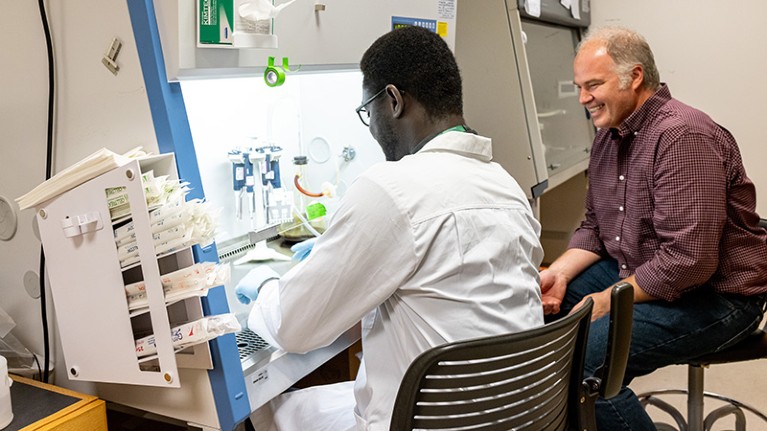In 2021, a few months into my undergraduate degree at Dartmouth College in Hanover, New Hampshire, I joined a skin cancer laboratory that enabled me to gain hands-on research experience through an independent project. Unlike many undergraduate research projects at my university, mine did not involve assisting a PhD candidate. Instead, it was a more autonomous endeavour, under the supervision of the principal investigator. The idea was that as I gained experience, I would go on to shape the trajectory of the project.
But the thought of participating and presenting in lab meetings — a crucial part of the learning experience — filled me with utter dread. About a month in, I had to present an update to five people at one of our regular meetings. This update encompassed the initial phase of my literature review, as well as progress updates on several practice experiments that I’d conducted. I spent more than four hours preparing my PowerPoint slides as well as my verbal delivery. What I could not prepare for was the sudden chill and the gripping fear of failure that overcame me as I began my presentation.
Looking back, I think this fear comes from my high-school experience: I was bullied, and this deeply damaged my confidence. But understanding the root of the problem and being able to overcome it are two very different things.
Weight of expectation
Despite my meticulous preparation, I felt as if each slide, word and pause was judged and scrutinized. Although my mentors and colleagues created a friendly environment during the meeting, the fear of stumbling over my words or failing to convey the significance of my research loomed large. My tummy hurt, my fingers trembled, negative thoughts raced through my head and I could feel the weight of expectation bearing down on me.

Kwabena Boahen Asare and his research mentor, Matthew Hayden, in a Dartmouth Cancer Center research laboratory in New Hampshire.Credit: Lars Blackmore for Dartmouth Health
After my presentation, my mentor, Matthew Hayden, commended me on my work and offered guidance for future experiments and presentations. He advised me to make a few adjustments in future to my slide production and experimental approach, and also to keep a single running document with notes from my literature review. I acted on his feedback, incorporating the recommendations into my lab procedures as well as my approach to future presentations. With each adjustment and refinement, I improved not only my research methods but also my method of lab presentation. Yet however much I progressed, I was still terrified of those lab meetings at the start of each week.
Four helpful strategies
Knowing I was going to continue doing research throughout my undergraduate education and that I’d be engaging in stage presentations in my future career, I knew I had to conquer my fear of public speaking. Here are some strategies I used.
Breathe and relax. The first thing I did to get advice on how to overcome public-speaking anxiety was to turn to YouTube. One channel that particularly stood out to me was ‘Take a Deep Breath’, which focuses on breathing exercises for relaxation, wellness and motivation. Through watching one video after another, and reading comments under the videos, the first thing I learnt was that I was far from alone: many people dread public speaking.
How I harnessed media engagement to supercharge my research career
Although these breathing exercises are not specifically for managing stage anxiety, I found that performing them before presentations drastically reduced my nerves. Before every presentation, I would breathe in, hold my breath for a few seconds and then breathe out. With experience, I learnt that the calmer I was before and during a presentation, the less likely I was to have thoughts of self-doubt running through my head. By remaining relaxed through these breathing exercises, my delivery improved and I felt much better afterwards, too.
Imagine there’s no audience. During presentations, I would maintain focus on the content I was presenting rather than on the reactions of my audience. I imagined that there was no one in the audience, which helped me to focus on conveying the material effectively. Even though I might have made eye-contact with those listening, maintaining this mental framework allowed me to concentrate on delivering the content with clarity and confidence.
Seek an honest response. After each presentation, I would ask for feedback. Instead of being overshadowed by self-doubt, I took proactive steps to confront and address my fears head-on. For instance, one of my lab mentors mentioned after one presentation I gave that although I’d effectively captured the research progress I had made, I’d sometimes sped through my slides or not explained concepts that others might have found unfamiliar.
How I made my lab meetings more inclusive with a rapid-relay technique
This feedback helped me to improve my presentations. Seeking and accepting honest feedback allowed me to break free from the cycle of self-doubt and insecurity that had plagued me for so long.
After every presentation, I reflected on my delivery, and took note of what worked and what I could improve on. This helped me to identify patterns in my performance and pinpoint specific areas for improvement that might not have been the apparent from feedback alone.
Keep rehearsing. Finally, after preparing my slides for a lab meeting, I rehearsed them at least three times. I didn’t just rehearse the content: I also focused on my delivery, paying attention to my tone, pace and body language. And I prepared a mental or written script for each slide, ensuring that I had a clear idea of what to convey. I did not memorize the scripts verbatim, because previous experiences had taught me that relying too heavily on memory heightened my anxiety. Instead, I prioritized understanding the key points and concepts, allowing for a more natural and engaging delivery. After solo practice, I would also present to friends and ask for their feedback.
Solid stepping stones
These weekly lab meetings have enabled me to confront my fears head-on. Each presentation, regardless of how frightening it might have been, served as a stepping stone to overcoming my stage fright and becoming a more confident speaker.
At last year’s Karen E. Wetterhahn Science Symposium, an annual event at Dartmouth College at which undergraduates present posters about research projects that they’ve been involved with, nothing beat the joy I felt after receiving positive feedback from people who stopped by my poster. It affirmed the progress I’ve made and fuelled my determination to continue pushing my boundaries.
I might not be at the level I aspire to be at in terms of stage delivery, but I know that with each practice and each lab meeting, I am getting closer to where I want to be.



